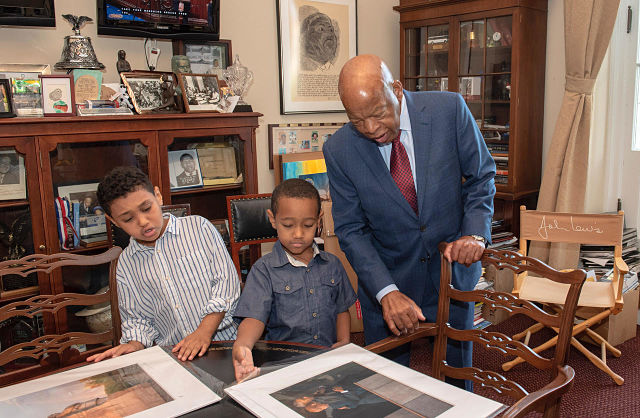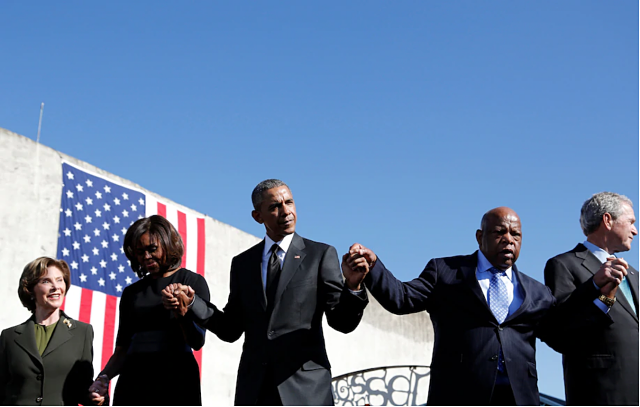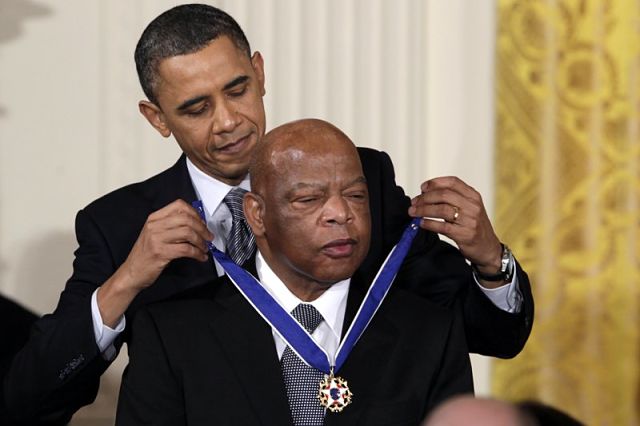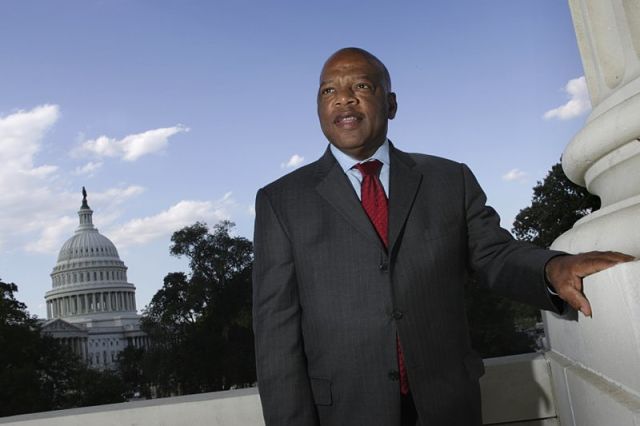 Children of the photographer Gediyon Kifle meeting with Congressman John Lewis at his office on Capitol Hill in Washington, D.C. two years ago. (c)Gediyon Kifle www.PhotoGK.com
Children of the photographer Gediyon Kifle meeting with Congressman John Lewis at his office on Capitol Hill in Washington, D.C. two years ago. (c)Gediyon Kifle www.PhotoGK.com
Tadias Magazine
By Tadias Staff
Updated: July 31st, 2020
New York (TADIAS) — The following is a slide show of pictures courtesy of Ethiopian American Photographer Gediyon Kifle celebrating civil rights icon Congressman John Lewis who passed away last Friday at the age of 80.
Rep. John Lewis, who was one of the heroes of the American civil rights movement, was a speaker at the 1963 March on Washington where Martin Luther King gave his famous “I have a dream” speech. As AP noted: “He was best known for leading some 600 protesters in the Bloody Sunday march across the Edmund Pettus Bridge in Selma, [Alabama]. At age 25 — walking at the head of the march with his hands tucked in the pockets of his tan overcoat — Lewis was knocked to the ground and beaten by police. His skull was fractured, and nationally televised images of the brutality forced the country’s attention on racial oppression in the South. Within days, King led more marches in the state, and President Lyndon Johnson soon was pressing Congress to pass the Voting Rights Act. The bill became law later that year, removing barriers that had barred Blacks from voting.”
“Mesmerized by John Lewis’ humility and fighting sprit” since he was a child and “inspired by his sacrifice during the last decade or so,” Gediyon shares that it has been “a privilege to photograph him and see him up close.” He added: “To experience his calming presence and generosity. And to introduce him to my children. A day I will never forget. A man I will never forget.”
Here are the photos courtesy of Gediyon Kifle:
—
Related:
Obama delivers call to action in eulogy for Lewis, likens tactics by Trump and administration to those by racist Southern leaders who fought civil rights
Former president Barack Obama criticized the government’s use of force against peaceful protesters at Rep. John Lewis’s (D-Ga.) funeral on July 30, 2020 in Atlanta. (The Washington Post)
Former president Barack Obama delivered a call to action in his eulogy Thursday of late congressman John Lewis, urging Congress to pass new voting rights laws and likening tactics by President Trump and his administration to those used by racist Southern leaders who fought the civil rights movement in the 1960s.
Obama, speaking for 40 minutes at the pulpit where the Rev. Martin Luther King Jr. once preached, tied Lewis’s early life as a Freedom Rider to the nationwide protests that followed the killing of George Floyd at the hands of Minneapolis police. He compared today’s federal agents using tear gas against peaceful protesters, an action that Trump has cheered on, to the same attacks Lewis faced on the Edmund Pettus Bridge in Selma, Ala., in 1965.
“Bull Connor may be gone, but today we witness with our own eyes police officers kneeling on the necks of Black Americans,” the nation’s first Black president said at Lewis’s final memorial service. “George Wallace may be gone, but we can witness our federal government sending agents to use tear gas and batons against peaceful demonstrators. We may no longer have to guess the number of jelly beans in a jar in order to cast a ballot, but even as we sit here there are those in power who are doing their darndest to discourage people from voting.”
Obama slams government response to policing protests, says democracy must be ‘nurtured’
Obama was one of three former presidents — along with George W. Bush and Bill Clinton — to honor the late congressman at Ebenezer Baptist Church in Atlanta. A fourth, 95-year-old Jimmy Carter, too frail to travel, sent a tribute note read from the podium.
—
John Lewis to be honored by Biden, lawmakers and the public as he lies in state at the Capitol
Updated: July 27th, 2020
The body of the late congressman John Lewis made a final journey Monday to the capital’s civil rights landmarks, pausing at the Martin Luther King Jr. and Lincoln memorials, before he lies in state at the same spot in the Capitol as presidents and other national leaders.
The motorcade took the casket of Lewis (D-Ga.) past the Lincoln Memorial, where he was the youngest speaker at the 1963 March on Washington, and the newly minted Black Lives Matter Plaza outside the White House, where the civil rights icon made his last public appearance in early June. As “Amazing Grace” could be heard, the hearse paused at the plaza.
Lewis, who was diagnosed in late December with pancreatic cancer, died July 17.
“To see him there, to see him there from one generation into the future, we’re so blessed,” House Speaker Nancy Pelosi (D-Calif.) said Sunday on CBS’s “Face the Nation.” “He was a titan of the civil rights movement. He was the conscience of the Congress.”
After an arrival ceremony in the Capitol’s Rotunda, a host of high-profile people will get to pay their respects inside the building, a group that will bring the 2020 presidential campaign front and center. Presumptive Democratic presidential nominee Joe Biden will be among those who will honor Lewis.
Lewis will be only the second black lawmaker to lie in state in the Capitol, after his close friend, Rep. Elijah E. Cummings (D-Md.), who died in October lay in state in National Statuary Hall.
Like Cummings, whose casket was then positioned in front of the door to the House chamber for the public to pay tribute, Lewis’s casket will be moved out of the Rotunda.
—
Obama, Biden, White House and Others Pay Tribute to Rep. John Lewis (UPDATE)

In this 2015 photo, Rep. John Lewis joins hands with President Barack Obama, first lady Michelle Obama, former president George W. Bush and former first lady Laura Bush during a commemoration of the 50th anniversary of the Bloody Sunday march at the Edmund Pettus Bridge in Selma, Alabama. (Reuters photo)
The Washington Post
John Lewis tributes pour in from leaders across the country
The tributes to Rep. John Lewis poured in Saturday morning, as leaders from across the political spectrum expressed gratitude and reverence for the civil rights icon’s commitment to racial justice, even at great personal cost.
“I first met John when I was in law school, and I told him then that he was one of my heroes. Years later, when I was elected a U.S. Senator, I told him that I stood on his shoulders,” former president Barack Obama wrote in a eulogy on Medium. “When I was elected President of the United States, I hugged him on the inauguration stand before I was sworn in and told him I was only there because of the sacrifices he made.”
The Georgia Democrat, who died Friday at 80, spoke at the 1963 March on Washington. Lewis led the march for voting rights across the Edmund Pettus Bridge in Selma, Ala., in 1965in what became known as “Bloody Sunday.” Lewis suffered a brutal beating by police who violently confronted the demonstrators with bullwhips and nightsticks.
It was appropriate then that his final public act was to visit the newly named Black Lives Matter Plaza on a street leading to the White House — a symbol of the progress the country has made on issues of racial justice and the work that still needed to be done.
D.C. Mayor Muriel E. Bowser (D), who accompanied Lewis on that visit, described him “as the conscience of Congress . . . the conscience of our nation.”
“John Lewis had faith in our nation and in the next generation,” she wrote on Twitter. “He warned us not to get lost in despair. So, in this moment of grief, we are hopeful — we are hopeful that, collectively, we can live up to his legacy.”
John Lewis to Black Lives Matter protesters: ‘Give until you can’t give anymore’
Former vice president Joe Biden, the presumptive Democratic nominee for president, released a stirring statement on behalf of himself and his wife, Jill.
“We are made in the image of God, and then there is John Lewis,” Biden began. “How could someone in flesh and blood be so courageous, so full of hope and love in the face of so much hate, violence, and vengeance?”
“He was truly a one-of-a-kind, a moral compass who always knew where to point us and which direction to march,” Biden wrote.
Hillary Clinton, the 2016 Democratic presidential candidate, called Lewis “the truest kind of patriot.”
“He believed America could be better, even live up to its highest founding ideals of equality & liberty for all. He made good trouble to help us get there. Now it’s up to the rest of us to carry on his work,” she tweeted.
—
John Lewis, Lion of Civil Rights and U.S. Congress, Dies at 80

President Barack Obama presents a 2010 Presidential Medal of Freedom to U.S. Rep. John Lewis during a ceremony at the White House in Washington on Feb. 15, 2011. House Speaker Nancy Pelosi confirmed Lewis’ passing late Friday night, calling him “one of the greatest heroes of American history.” (AP Photo)
The Associated Press
Updated: July 18th, 2020
ATLANTA (AP) — John Lewis, a lion of the civil rights movement whose bloody beating by Alabama state troopers in 1965 helped galvanize opposition to racial segregation, and who went on to a long and celebrated career in Congress, died. He was 80.
House Speaker Nancy Pelosi confirmed Lewis’ passing late Friday night, calling him “one of the greatest heroes of American history.”
“All of us were humbled to call Congressman Lewis a colleague, and are heartbroken by his passing,” Pelosi said. “May his memory be an inspiration that moves us all to, in the face of injustice, make ‘good trouble, necessary trouble.’”
The condolences for Lewis were bipartisan. Senate Majority Leader Mitch McConnell said Lewis was “a pioneering civil rights leader who put his life on the line to fight racism, promote equal rights, and bring our nation into greater alignment with its founding principles. ”
Lewis’s announcement in late December 2019 that he had been diagnosed with advanced pancreatic cancer — “I have never faced a fight quite like the one I have now,” he said — inspired tributes from both sides of the aisle, and an unstated accord that the likely passing of this Atlanta Democrat would represent the end of an era.
The announcement of his death came just hours after the passing of the Rev. C.T. Vivian, another civil rights leader who died early Friday at 95.
Lewis was the youngest and last survivor of the Big Six civil rights activists, a group led by the Rev. Martin Luther King Jr. that had the greatest impact on the movement. He was best known for leading some 600 protesters in the Bloody Sunday march across the Edmund Pettus Bridge in Selma.
John Lewis 1940-2020

In this Wednesday, Oct. 10, 2007, file photo, with the Capitol Dome in the background, U.S. Rep. John Lewis, D-Ga., is seen on Capitol Hill in Washington. Lewis died Friday, July 17, 2020. (AP Photo)
At age 25 — walking at the head of the march with his hands tucked in the pockets of his tan overcoat — Lewis was knocked to the ground and beaten by police. His skull was fractured, and nationally televised images of the brutality forced the country’s attention on racial oppression in the South.
Within days, King led more marches in the state, and President Lyndon Johnson soon was pressing Congress to pass the Voting Rights Act. The bill became law later that year, removing barriers that had barred Blacks from voting.
“John is an American hero who helped lead a movement and risked his life for our most fundamental rights; he bears scars that attest to his indefatigable spirit and persistence,” House Majority Leader Steny Hoyer said after Lewis announced his cancer diagnosis.
Lewis joined King and four other civil rights leaders in organizing the 1963 March on Washington. He spoke to the vast crowd just before King delivered his epochal “I Have a Dream” speech.
A 23-year-old firebrand, Lewis toned down his intended remarks at the insistence of others, dropping a reference to a “scorched earth” march through the South and scaling back criticisms of President John Kennedy. It was a potent speech nonetheless, in which he vowed: “By the forces of our demands, our determination and our numbers, we shall splinter the segregated South into a thousand pieces and put them together in an image of God and democracy.”
It was almost immediately, and forever, overshadowed by the words of King, the man who had inspired him to activism.
Lewis was born on Feb. 21, 1940, outside the town of Troy, in Pike County, Alabama. He grew up on his family’s farm and attended segregated public schools.
As a boy, he wanted to be a minister, and practiced his oratory on the family chickens. Denied a library card because of the color of his skin, he became an avid reader, and could cite obscure historical dates and details even in his later years. He was a teenager when he first heard King preaching on the radio. They met when Lewis was seeking support to become the first Black student at Alabama’s segregated Troy State University.
He ultimately attended the American Baptist Theological Seminary and Fisk University in Nashville, Tennessee. He began organizing sit-in demonstrations at whites-only lunch counters and volunteering as a Freedom Rider, enduring beatings and arrests while traveling around the South to challenge segregation.
Lewis helped found the Student Nonviolent Coordinating Committee and was named its chairman in 1963, making him one of the Big Six at a tender age. The others, in addition to King, were Whitney Young of the National Urban League; A. Philip Randolph of the Negro American Labor Council; James L. Farmer Jr., of the Congress of Racial Equality; and Roy Wilkins of the NAACP. All six met at the Roosevelt Hotel in New York to plan and announce the March on Washington.
The huge demonstration galvanized the movement, but success didn’t come quickly. After extensive training in nonviolent protest, Lewis and the Rev. Hosea Williams led demonstrators on a planned march of more than 50 miles from Selma to Montgomery, Alabama’s capital, on March 7, 1965. A phalanx of police blocked their exit from the Selma bridge.
Authorities shoved, then swung their truncheons, fired tear gas and charged on horseback, sending many to the hospital and horrifying much of the nation. King returned with thousands, completing the march to Montgomery before the end of the month.
Lewis turned to politics in 1981, when he was elected to the Atlanta City Council.
He won his seat in Congress in 1986 and spent much of his career in the minority. After Democrats won control of the House in 2006, Lewis became his party’s senior deputy whip, a behind-the-scenes leadership post in which he helped keep the party unified.
In an early setback for Barack Obama’s 2008 Democratic primary campaign, Lewis endorsed Hillary Rodham Clinton for the nomination. Lewis switched when it became clear Obama had overwhelming Black support. Obama later honored Lewis with the Presidential Medal of Freedom, and they marched hand in hand in Selma on the 50th anniversary of the Bloody Sunday attack.
In a statement following his death, President Bill Clinton and former Secretary of State Hillary Clinton praised Lewis as a “giant” who became “the conscience of the nation.”
Lewis also worked for 15 years to gain approval for the Smithsonian’s National Museum of African American History and Culture. Humble and unfailingly friendly, Lewis was revered on Capitol Hill — but as one of the most liberal members of Congress, he often lost policy battles, from his effort to stop the Iraq War to his defense of young immigrants.
He met bipartisan success in Congress in 2006 when he led efforts to renew the Voting Rights Act, but the Supreme Court later invalidated much of the law, and it became once again what it was in his youth, a work in progress. Later, when the presidency of Donald Trump challenged his civil rights legacy, Lewis made no effort to hide his pain.
Lewis refused to attend Trump’s inauguration, saying he didn’t consider him a “legitimate president” because Russians had conspired to get him elected. When Trump later complained about immigrants from “s—hole countries,” Lewis declared, “I think he is a racist … we have to try to stand up and speak up and not try to sweep it under the rug.”
Lewis said he’d been arrested 40 times in the 1960s, five more as a congressman. At 78, he told a rally he’d do it again to help reunite immigrant families separated by the Trump administration.
“There cannot be any peace in America until these young children are returned to their parents and set all of our people free,” Lewis said in June, recalling the “good trouble” he got into protesting segregation as a young man.
“If we fail to do it, history will not be kind to us,” he shouted. “I will go to the border. I’ll get arrested again. If necessary, I’m prepared to go to jail.”
In a speech the day of the House impeachment vote of Trump, Lewis explained the importance of that vote.
“When you see something that is not right, not just, not fair, you have a moral obligation to say something, to do something. Our children and their children will ask us ’what did you do? what did you say?” While the vote would be hard for some, he said: “We have a mission and a mandate to be on the right side of history.”
Lewis’ wife of four decades, Lillian Miles, died in 2012. They had one son, John Miles Lewis.
—
Join the conversation on Twitter and Facebook.

























